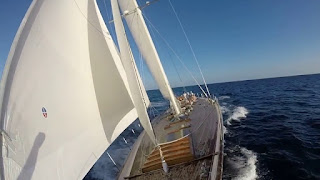Wake up and Go Racing
Go for a walk around any marina on a Saturday afternoon and
you will be struck by the numbers of boats sitting idle in their pens or
swinging on their moorings. It always surprises me that these craft sit indolent
weekend after weekend. In my line of work I come across all the spectrum of
boat owners. From hard-core racing sailors to long distance cruisers, but
easily the biggest group would be the recreational sailor. This individual or
couple that own the boat see themselves as fun sailors who wants to have a bit
of a jaunt with friends on a leisurely afternoon sail or even partake in the
odd twilight race. Mention weekend racing and they recoil in horror, no way
they can deal with all that angst and screaming with boats crashing and
bashing. Let alone the cost of keeping up with the true racers and their arms
race mentality as they turn up with their paid hands and the latest genetically
engineered tungsten fibred 6th dimensional mainsail. Not for me they
say!
But there are a myriad of reasons why these recreational
sailors should embrace the racing aspect of our sport. One of the main ones is
nearly all these people have a longer term plan, which usually involves a
significant undertaking like a major voyage, once they become more competent
and confident as seafarers.
Better sailors.
The fact is they will become better sailors with
participation in some aspect of racing. It will be beneficial for them and
their boat’s integrity. Some of the highest profile cruising sailors readily
admit they learn more on the race course in a few days racing than months of
sailing around at a leisurely pace. First of all you will be tested; races are
run in all conditions and around set marks, there is no shirking a big gust or
taking the easy route. You and your boat will be tried and as a result the
learning curve greatly enhanced. Once you have made a commitment to meet up
with your crew you are much more likely to sail in inclement weather. A bit
like having to get out of bed for that early run to meet someone rather than
snuggling further under the doona. You will learn a lot more about getting
through tough conditions on the race course than lazing on a Sunday afternoon,
as the song goes.
Take it gradually.
When beginning to race, you can ease in slowly. You can pick
and choose your race courses and just do the less demanding ones. Most of the
yacht clubs will have a variety of racing to appease all levels; you don’t have
to do every one, just those that suit your situation. It can really be no
different from a cruise in company depending on your mindset. A leisurely sail
around some marks with other boats and some added interest with results at the
end.
The start of a yacht race is the one that seems to create
the most anxiety. Well you don’t have to be gung-ho in your approach, you can
simply keep away and sail through the line after the bulk of the fleet has
started. A lot of long-time racing sailors follow this approach (some that
don’t actually intend to) and it makes for a quite minimum fuss start with no
hassles. After a little while you and your crew will become familiar with your
boat’s nuances and begin to move closer and closer to the line as the starting
gun fires or even to start on the line in the less congested areas.
Crew
Another reason for non-participation is the need for of a
lot crew, well if you have enough crew to go for a sail then you have enough to
race. There is no absolute need for teams of gorillas to run up and down the
boat trimming, roll tacking and sail changing. You can race as you cruise! If
you are shorthanded you don’t need to fly that spinnaker or push your vessel
really hard. You can take a few rolls in the furling genoa and take in a reef
or two to make it easier, remember what I said earlier about improving your
boat-handling skills?
Cost
The cost of racing does not need to be prohibitive in order
to be competitive, for all the whinging and wailing that “real” racers carry on
about arbitrary handicaps (your scribe included). It does serve a great
levelling purpose in regard to the arms race mentality. After a few races your
handicap will reflect your performance so far as it levels out, with the crew
numbers, older sails and less physical sailing taken into account. The whole
process of arbitrary handicapping is to reward improvement over your past
results. So you will eventually find an appropriate handicap and will find
yourself moving up the scoreboard as you improve, which you will.
Insurance
Extra Insurance for racing can be easily added to your
cover, this in most cases would cover up to 100 miles offshore and may require
a higher premium and excess but that is to be expected and well worth the
mental reassurance
Social
Participating in your local races will greatly enhance your
social contacts around the club as you converse on the anecdotes from that days
racing over refreshing ale. As a result of this contact your knowledge base will
broaden further and one thing about sailors, they like to spend time in each
other’s company.
So seriously consider getting out there and dipping your
toes in the waters of the racecourse. It will only help your sailing knowledge,
boat handling skills and preparation.
Don’t just own it, sail it!




Comments
Post a Comment